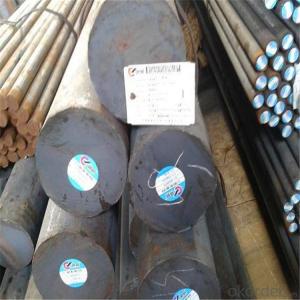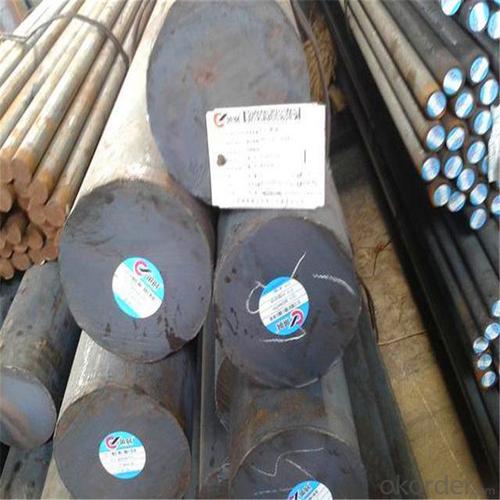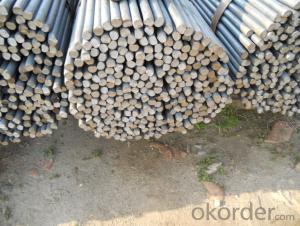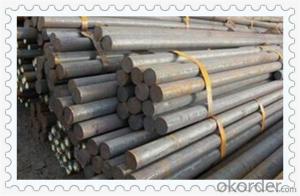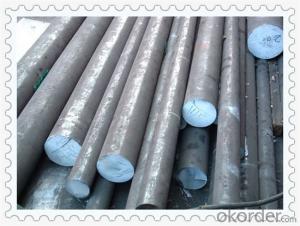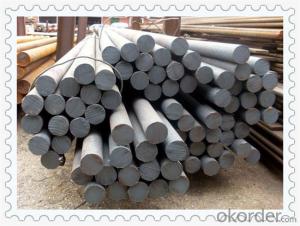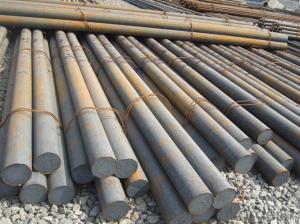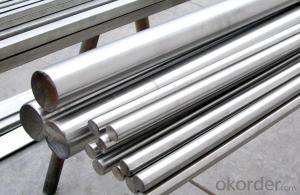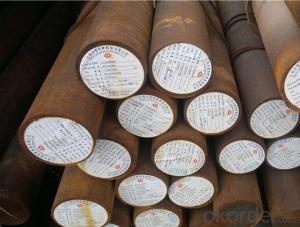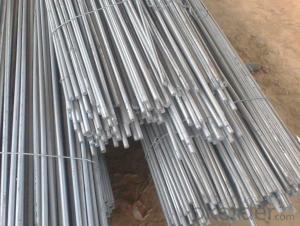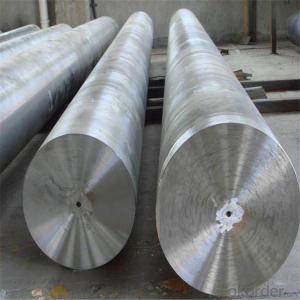Gear Steel 20CrMnTi Forged Round Steel Bar
- Loading Port:
- Tianjin
- Payment Terms:
- TT OR LC
- Min Order Qty:
- 100 m.t.
- Supply Capability:
- 50000 m.t./month
OKorder Service Pledge
OKorder Financial Service
You Might Also Like
Specification
Gear Steel 20CrMnTi Forged Round Steel Bar
Product Description of Gear Steel 20CrMnTi Forged Round Steel Bar
1. Steel grade: 20CrMnTi
2. Length: 6M-12M
3. Diameter: 16mm-300mm
4. Product range: round bar, flat bar, square bar
5. Technique: Hot rolled, forged, cold drawn
Specification of High Quality Carbon Structural Steel Round Bar CK45
Material | 20CrMnTi | Round bar | Dia(mm) | 16-300mm |
Process | EAF + LF + VD + Forged + Heat Treatment (optional) | Length (mm) | Max 12m | |
Heat treatment | Normalized / Annealed / Quenched / tempered | Flat bar | Thickness(mm) | 8-500mm |
Delivery condition | Hot forged +Rough machined (black surface after Q/T)+ Turned (optional) | Width(mm) | 70-200mm | |
Test | Ultrasonic test according to SEP 1921-84 D/d | Length (mm) | Max 12m |
Chemical Composition of Gear Steel 20CrMnTi Forged Round Steel Bar
C | Si | Mn | Cr | Ni | Cu |
0.42~0.47 | 0.17~0.37 | 0.35~0.65 | ≤0.25 | ≤0.30 | ≤0.25 |
Photo Show of Gear Steel 20CrMnTi Forged Round Steel Bar
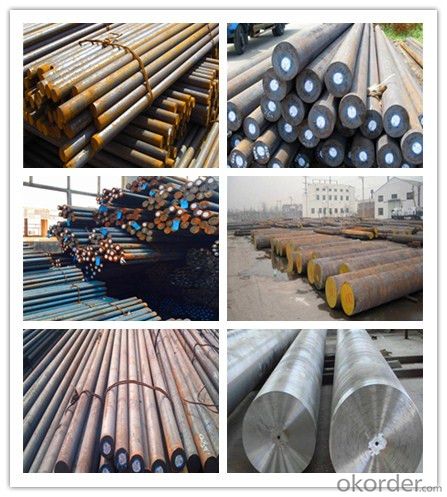
Packing and Delivery:
Packing in bundle package, or as customer's requirements.
Delivery Detail: 45 days after receiving the deposit.
Usage and Applications of Gear Steel 20CrMnTi Forged Round Steel Bar
1. Steel round bar is used in a large number of architectural and engineering structures. Or it can be used in construction of plants for the production of steel house frames, high-voltage transmission towers, bridges, vehicles, boilers, containers, ships, etc.
2. And we can use this kind of product on the performance of the mechanical parts if the demand is not very high.
3. Some special material steel round bar can be used for main shaft of steamer, hummer shank, with big section and supper force.
Company Information
CNBM International Corporation is the most important trading platform of CNBM group.
Whith its advantages, CNBM International are mainly concentrate on Cement, Glass, Iron and Steel, Ceramics industries and devotes herself for supplying high qulity series of refractories as well as technical consultancies and logistics solutions.


F A Q
1, Your advantages?
professional products inquiry, products knowledge train (for agents), smooth goods delivery, excellent customer solution proposale
2, Test & Certificate?
SGS test is available, customer inspection before shipping is welcome, third party inspection is no problem
3, Factory or Trading Company?
CNBM is a trading company but we have so many protocol factories and CNBM works as a trading department of these factories. Also CNBM is the holding company of many factories.
4, Payment Terms?
30% TT as deposit and 70% before delivery.
Irrevocable L/C at sight.
5, Trading Terms?
EXW, FOB, CIF, FFR, CNF
6, After-sale Service?
CNBM provides the services and support you need for every step of our cooperation. We're the business partner you can trust.
For any problem, please kindly contact us at any your convenient time.
We'll reply you in our first priority within 24 hours.
- Q: What is the difference between a solid steel round bar and a hollow steel round bar?
- A solid steel round bar is a cylindrical metal rod that has a uniform diameter throughout its entire length. It is made of solid steel, meaning it does not have any hollow or empty space inside. On the other hand, a hollow steel round bar also has a cylindrical shape but contains a hollow or empty space within its center. This hollow space can vary in size, depending on the specific design and purpose of the hollow round bar. The main difference between the two lies in their structural integrity and weight-bearing capacity. A solid steel round bar offers greater strength and stability compared to a hollow steel round bar. This is because the solid bar is made of a continuous steel material, making it more resistant to bending, twisting, or deforming under pressure. It is commonly used in applications where high strength and durability are required, such as construction, engineering, and manufacturing industries. In contrast, a hollow steel round bar may have reduced strength and load-bearing capacity due to the presence of the hollow space within. However, the hollow design provides certain advantages in terms of weight, cost, and flexibility. The hollow space allows for a lighter overall weight of the bar, making it more suitable for applications where weight is a critical factor, such as aerospace or automotive industries. Additionally, the hollow space can be utilized for various purposes, such as passing through electrical wires or fluids, providing a channel for ventilation, or even reducing material costs by using less steel. Ultimately, the choice between a solid steel round bar and a hollow steel round bar depends on the specific requirements of the application. If strength and stability are paramount, a solid bar would be the preferred choice. Conversely, if weight reduction, cost-efficiency, or additional functionality is desired, a hollow bar may be more suitable.
- Q: How do steel round bars perform under cyclic loading?
- Steel round bars typically perform well under cyclic loading due to their high strength and ductility. When subjected to repeated or cyclic loading, these bars can withstand significant stress without experiencing deformation or failure. The fatigue behavior of steel round bars is influenced by various factors, such as the material composition, heat treatment, and surface finish. Steel bars with higher tensile strength and hardness tend to exhibit better resistance to fatigue, as they can withstand higher stress levels before failure occurs. Under cyclic loading, steel round bars undergo stress cycles that cause alternating compression and tension forces. These cycles can lead to the initiation and propagation of cracks, ultimately leading to failure. However, steel's inherent ductility allows it to absorb energy and redistribute stress, which helps to mitigate crack propagation and extend the fatigue life of the bar. The fatigue strength of steel round bars is typically determined through fatigue tests, where the bars are subjected to a specified number of stress cycles until failure occurs. The results of these tests provide valuable information on the endurance limit and fatigue life of the steel bar under different loading conditions. To enhance the fatigue performance of steel round bars, various techniques can be employed, such as shot peening, surface coating, and residual stress induction. These techniques can introduce compressive stress on the bar's surface, which helps to inhibit crack initiation and propagation, thereby improving its fatigue resistance. Overall, steel round bars are reliable and durable under cyclic loading, making them suitable for applications that involve repeated or fluctuating stresses, such as structural components, automotive parts, and machinery components. However, it is essential to consider the specific loading conditions, material properties, and design criteria when selecting steel round bars to ensure optimal performance and longevity.
- Q: What is the maximum chromium content allowed for steel round bars?
- The maximum chromium content allowed for steel round bars depends on the specific grade or specification of the steel. Generally, the chromium content in steel round bars can range from 0.15% to 30%, but this can vary greatly depending on the intended application and desired properties of the steel. Higher chromium content is often found in stainless steel grades, which are known for their corrosion resistance. It is important to consult the relevant industry standards or specifications to determine the maximum chromium content allowed for specific steel round bars.
- Q: What are the different tolerances for steel round bars?
- There are various tolerances for steel round bars, depending on the specific requirements and standards set by different industries and applications. These tolerances ensure that the dimensions and surface conditions of the steel round bars meet the desired specifications. The most common tolerance for steel round bars is the diameter tolerance. This refers to the allowable deviation from the specified diameter. For example, a steel round bar with a diameter tolerance of +/- 0.005 inches means that the actual diameter of the bar can vary within this range. Another important tolerance for steel round bars is the straightness tolerance. This refers to the allowable deviation from a straight line over a specified length of the bar. Straightness tolerances are usually given in terms of the maximum deviation in relation to the length, such as 0.010 inches per foot. Surface finish tolerance is also crucial for steel round bars. It refers to the acceptable variation in the surface texture or roughness of the bar. This tolerance is often specified using parameters such as Ra (average roughness) or Rz (maximum roughness depth). For example, a surface finish tolerance of Ra 0.8 micrometers means that the average roughness of the bar's surface should not exceed this value. In addition to these common tolerances, there may be other specific tolerances based on the intended application of the steel round bars. These can include tolerances for straightness, length, weight, or other dimensional properties. It is important to note that the tolerances for steel round bars can vary depending on the standards followed by different industries and countries. It is always recommended to refer to the relevant standards or specifications to determine the specific tolerances required for a particular application.
- Q: How do steel round bars compare to other materials in terms of strength?
- Steel round bars are known for their exceptional strength compared to other materials. Steel has a high tensile strength, which means it can withstand heavy loads and resist deformation. In comparison to materials like aluminum or plastic, steel round bars offer superior strength and durability, making them ideal for applications that require structural integrity and stability.
- Q: Cold drawn steel wire is a round bar or thread steel in Construction Engineering?
- Of course it belongs to round bar. Thread steel can not be obtained by cold drawing. Besides, the outer diameter of the cold drawn steel wire is smaller, the surface is smoother and the hardness is slightly higher.
- Q: What are the different surface treatments available for steel round bars?
- There are several surface treatments available for steel round bars, including: 1. Pickling and Passivation: This process involves removing impurities and oxides from the surface of the steel using an acid solution, followed by the application of a passivation treatment to enhance corrosion resistance. 2. Hot-dip Galvanizing: Steel round bars can be immersed in a bath of molten zinc, which forms a protective coating on the surface. This treatment provides excellent corrosion resistance. 3. Electroplating: This process involves applying a thin layer of metal, such as chromium or nickel, onto the surface of the steel round bar using an electrochemical method. It enhances the aesthetic appearance and provides some level of corrosion resistance. 4. Powder Coating: A dry powder is applied electrostatically to the steel round bar and then cured under heat. This results in a durable and protective coating that is resistant to corrosion, chemicals, and UV radiation. 5. Nitriding: In this treatment, the steel round bar is exposed to a nitrogen-rich atmosphere at high temperatures. This forms a hard and wear-resistant surface layer, improving the bar's performance in applications where hardness and durability are important. 6. Chrome Plating: A layer of chromium is electroplated onto the surface of the steel round bar, providing both aesthetic appeal and corrosion resistance. These are just a few examples of the different surface treatments available for steel round bars, and the choice depends on the specific requirements of the application, such as corrosion resistance, durability, and aesthetic considerations.
- Q: Can steel round bars be welded to other materials?
- Yes, steel round bars can be welded to other materials. The process typically involves using compatible welding techniques and materials, such as specific filler metals, to achieve a strong and durable bond between the steel round bar and the other material.
- Q: What is the difference between a hot-rolled and a peeled steel round bar?
- The production of a hot-rolled steel round bar involves heating a billet or ingot until it reaches a temperature suitable for shaping. The heated steel is then passed through a series of rollers to achieve the desired shape and size. This rolling process results in a bar with a rough surface texture and a slightly rounded edge. In contrast, a peeled steel round bar goes through a different manufacturing process. It is initially hot-rolled to achieve the desired shape and size, similar to the hot-rolled bar. However, after the initial hot rolling, the peeled bar undergoes a mechanical peeling process. This process entails removing the outer layer of the bar to achieve a smooth and shiny surface finish. Additionally, the peeling process contributes to improving the dimensional accuracy and surface quality of the bar. To summarize, the key distinction between a hot-rolled and a peeled steel round bar lies in the surface finish and dimensional accuracy. While a hot-rolled bar possesses a rough surface texture and a slightly rounded edge, a peeled bar exhibits a smooth and shiny surface finish with enhanced dimensional accuracy. The peeling process elevates the overall quality and appearance of the steel round bar, making it more appropriate for applications where aesthetics or precision hold significance.
- Q: Can steel round bars be used for making valves or fittings?
- Indeed, valves or fittings can be crafted using steel round bars. The utilization of steel is widespread in the production of valves and fittings owing to its commendable strength, resilience, and corrosion resistance. To cater to the specific criteria and demands, steel round bars can undergo machining or forging to attain the desired form for valves or fittings. Furthermore, heat treatment can be applied to steel round bars to bolster their mechanical attributes, rendering them suitable for applications involving elevated pressure or temperature. In conclusion, steel round bars present a versatile and dependable choice of material when it comes to manufacturing valves or fittings.
Send your message to us
Gear Steel 20CrMnTi Forged Round Steel Bar
- Loading Port:
- Tianjin
- Payment Terms:
- TT OR LC
- Min Order Qty:
- 100 m.t.
- Supply Capability:
- 50000 m.t./month
OKorder Service Pledge
OKorder Financial Service
Similar products
Hot products
Hot Searches
Related keywords
